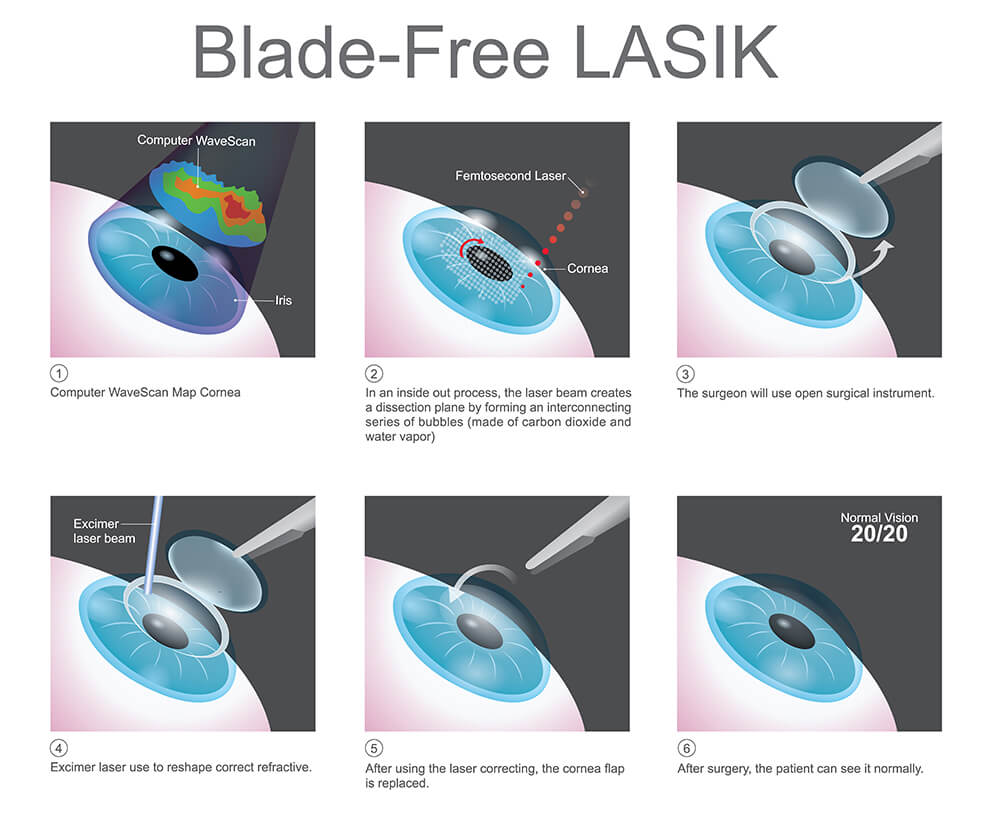What is LASIK surgery?

LASIK stands for laser-assisted in situ keratomileusis. “In situ keratomileusis” is medical terminology that more or less translates to “sculpting the cornea.” Reshaping the cornea with laser technology results in the correction of refractive errors such as nearsightedness, farsightedness, and astigmatism.
How does LASIK work?
During LASIK, an advanced laser is used to sculpt the cornea into a shape that corrects for the refractive error. The cornea can then refract light properly, thus eliminating the need for glasses or contacts.
The cornea is the front part of the eye where light enters and bends (refracts) to the back of the eye, where visual signals are sent to the brain. If the cornea is slightly elongated or short, light refracts in such a way that it does it not reach the back of the eye. This results in a refractive error such as nearsightedness, farsightedness, or astigmatism, which cause blurry vision at varying distances.
LASIK in Honolulu and Kahului
LASIK surgery is essentially painless and extremely fast — it only takes 15-20 minutes to perform the entire procedure. Before surgery, your surgeon will administer numbing eye drops to prevent any pain. A femtosecond laser is then used to make a micro-thin flap on the surface of the cornea. This flap is later used as a natural bandage to promote fast and comfortable recovery.
After the flap is created, it is lifted to expose the underlying corneal tissue. Your surgeon will then use an excimer laser to reshape the cornea in accordance with your prescription. While many patients feel a slight pressure when the flap is created, most don’t feel any sensation at all during the reshaping process.
Once the cornea is reshaped, the surgeon replaces the flap. It doesn’t need to be stitched into place as it naturally fuses back to the cornea over time.

What are the side effects of LASIK surgery?
The most common side effects of LASIK only last a couple of days.
These effects include:
- Soreness
- Itchiness
- Inflammation
- Dry Eye
These effects usually appear right after surgery once the numbing eye drops wear off. They can be mitigated by using prescribed eye drops after surgery. Your surgeon may also recommend using artificial tears and mild over-the-counter painkillers.
For the most part, the discomfort following LASIK only lasts a couple days. If they last longer than that, it may be an indication of a complication, so you should contact your surgeon if you experience prolonged discomfort.
What are the risks of LASIK surgery?
Dry eyes after LASIK can be quite common, but the condition is easily treatable with artificial tears or prescription medication. Poor night vision and light sensitivity are also common after LASIK, but most often go away within several weeks. Serious complications are extremely rare — according to the American Refractive Surgery Council, less than 1% of patients experience severe complications as a result of LASIK surgery.
Will I have perfect vision after LASIK?

There’s no way to guarantee that every patient who has LASIK achieves 20/20 vision. The vast majority of patients, however, do achieve 20/20 vision or better after LASIK. You can even maximize your chances of achieving perfect vision by opting for a custom LASIK procedure.
Custom LASIK uses 3D imaging to measure your prescription within .01 diopters, which makes the surgery much more precise. Patients who have custom LASIK almost always end up with at least 20/20 vision.
It’s important to recognize the limitations of surgery before deciding to undergo LASIK — perfect vision is never a guarantee. It can also take time to see the full results of laser vision correction. While most patients see an improvement to their vision immediately after surgery, your best vision will take a couple months of healing to achieve.
Am I a candidate for LASIK?
Most people qualify for LASIK surgery.
There are, however, a few requirements for being a good candidate for LASIK:
- You must be in good health
- You must be at least 21 years old
- You must hold a stable prescription for at least a year (although some surgeons prefer two years)
- Your prescription cannot exceed -11.00 diopters of nearsightedness, +5.00 diopters of farsightedness, and 5.00 diopters of astigmatism
- You must have a sufficiently thick cornea for the safe removal of tissue
If you do not meet the general requirements for LASIK, alternative procedures are available to reduce or eliminate your dependence on glasses and contacts. Your doctor will discuss your options for vision correction based on your overall health, medical history, lifestyle, and unique prescription.


April is Sports Eye Safety Month, and we're here to remind you that your eyes deserve protection in all of life's games. Whether you're a professional athlete or a weekend warrior, we have the protective solutions to keep you in the clear. 🏈🕶️ #SportsSafety #protectyoureyes #bennetteyeinstitute #lovelife ... See MoreSee Less
0 CommentsComment on Facebook
In celebration of World Health Day, we're shining a light on the integral role of eye health in your overall wellness. Regular eye exams are key to catching not only vision issues early but can also even be the first sign of other health concerns. Schedule your eye exam at any of our seven locations across the islands. 🌎👁️ #WorldHealthDay #eyeexamessentials #bennetteyeinstitute #lovelife ... See MoreSee Less
0 CommentsComment on Facebook
🌑✨ We're gearing up for an awe-inspiring celestial event - we can view a partial solar eclipse across the islands on April 8th! While it's a rare and exciting moment, it's crucial to protect your eyes. Looking directly at the sun, even during an eclipse, can cause permanent eye damage. Use eclipse glasses that meet the ISO 12312-2 international safety standard, consider pinhole projectors as an alternative method for indirect viewing, and remember, regular sunglasses don’t offer sufficient protection against the sun’s rays during an eclipse. 🌌🔭 #SolarEclipse2024 #EyeSafety #EclipseGlasses #ProtectYourEyes #AstronomicalEvent #BennettEyeInstitute #LoveLife ... See MoreSee Less
0 CommentsComment on Facebook
Think eating carrots is the secret to impeccable vision? Guess again! 🥕 We’re all about eye health, but let’s get one thing straight - our dedication to your vision is no laughing matter. Dive into real eye care with us. 🕶️ #AprilFools #NoJoke #EyeHealthMatters #Bennetteyeinstitute #LoveLife ... See MoreSee Less
0 CommentsComment on Facebook
🐰🌼 Hoppy Easter from our practice to all our wonderful patients! Wishing you a joyful and clear-sighted holiday! 🌸👀 #eyecare #happyeaster #visionhealth #bennetteyeinstitute #lovelife ... See MoreSee Less
0 CommentsComment on Facebook
Wave goodbye to winter and embrace the thrill of spring adventures 🌴✈️! Recent findings from RSC highlight a pivotal insight: 50% of adventurers are held back from fully enjoying activities like water sports due to the inconvenience of glasses or contacts. 😎 🏖️ Plus, a significant 55% agree that having clear, unaided vision could profoundly enhance their travel experiences. How much could clear vision transform your adventures? 🌍💬 #ClearVision #AdventureReady #SpringTravels #rscsurvey #bennetteyeinstitute #lovelife ... See MoreSee Less
0 CommentsComment on Facebook